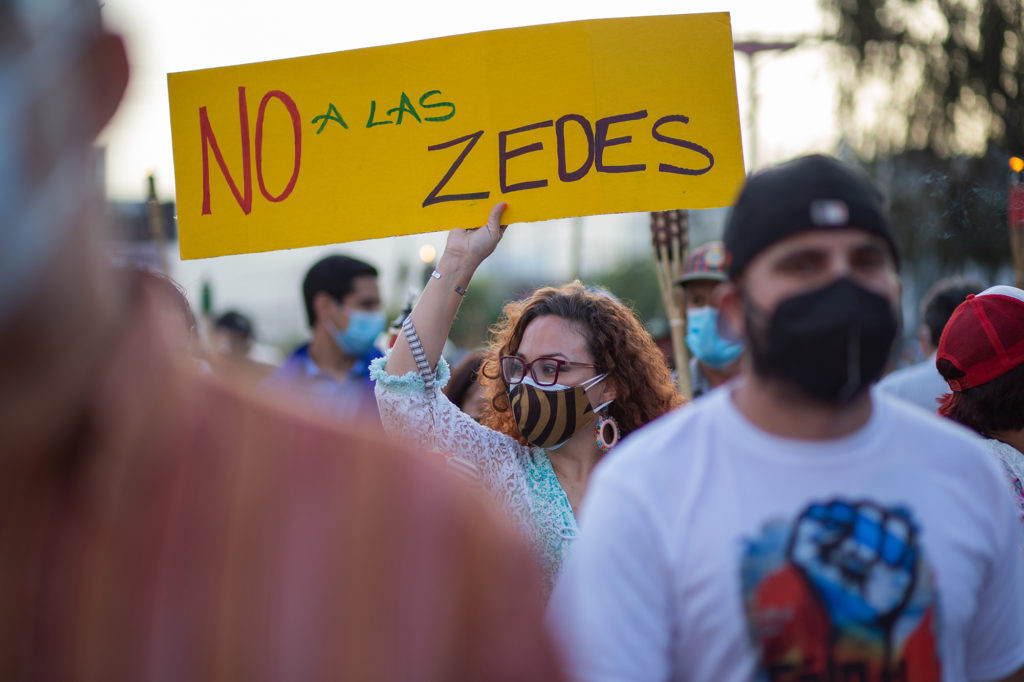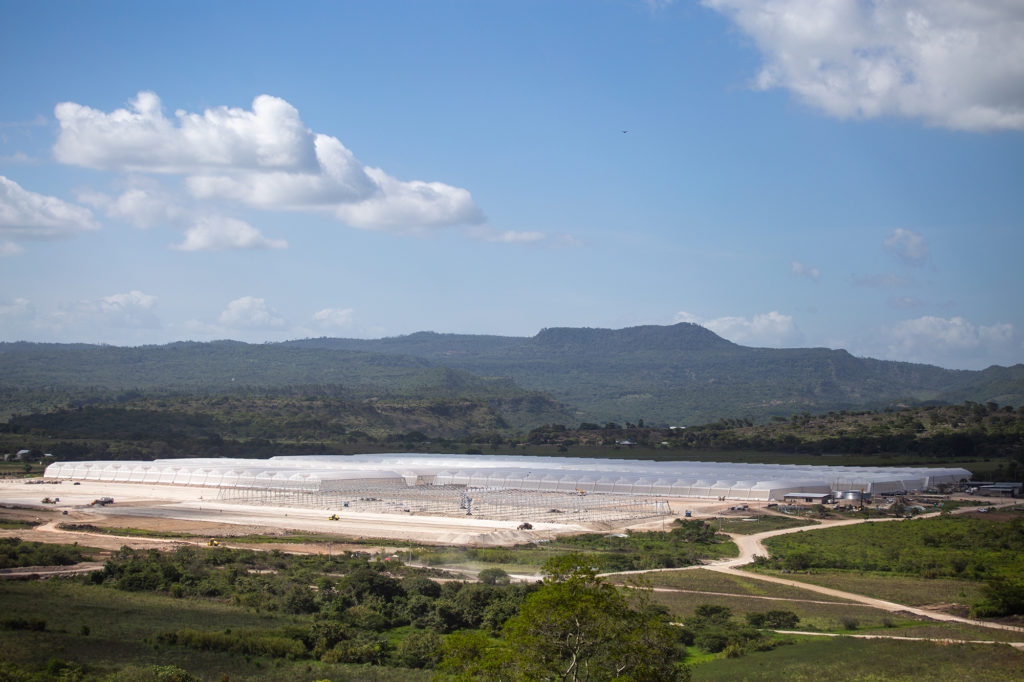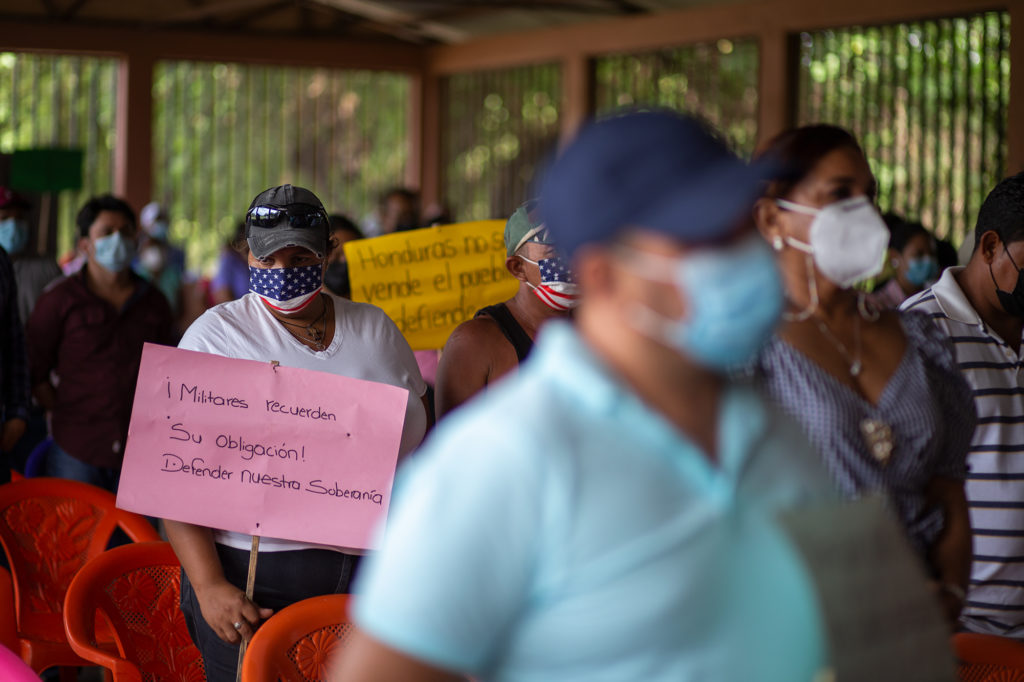Employment and Economic Development Zones (ZEDE) are proliferating in Honduras. Just three months before the November general elections, three political parties are proclaiming their opposition to the ZEDEs, but their plans to abolish them depend on winning the presidency and control of the National Congress.
By María Celeste Maradiaga
Photos by Martín Cálix
Just three months before the November general elections, the Employment and Economic Development Zones (ZEDE) are being compared to the banana enclaves that earned Honduras its “banana republic” moniker a century ago. The loudest opposition to the ZEDEs come from local civil society, and many candidates for political office have avoided discussion of how they propose to halt ZEDE development.
The law allowing the development of ZEDE economic zones in Honduras was enacted in 2013. ZEDEs are allowed to develop their own governance mechanisms, and the only Honduran laws that apply to them are the Constitution of the Republic and the Penal Code. The ZEDE law provides tax benefits and enables them to “establish autonomous and independent courts with exclusive jurisdiction.” The law also allows ZEDEs to adopt legal systems or practices from other countries.
Congressperson Jorge Cálix, a leader of the Liberty and Refoundation Party (Partido Libertad y Refundación – Libre), says that the only way to abolish ZEDEs is to win elections.
“We can talk all we want about eliminating ZEDEs in our country, but it’s all empty rhetoric if the National Party wins again,” said Cálix, who is seeking reelection.
The special ZEDE regime has been described as a tax haven for domestic and foreign investors. Three ZEDEs are currently being developed: Prosperous in Roatan (Bay Islands), Ciudad Morazan in Choloma (Cortes), and Orchid in San Marcos de Colon (Choluteca).
In an interview with Contracorriente, Cálix said that the only way to abolish these economic zones was to repeal the ZEDE law and provide presidential veto power over such initiatives, “The Libre Party has to beat the National Party in the upcoming elections, because only by controlling the executive and legislative branches can we repeal the constitutional provisions that enable the ZEDEs to exist.”
“It’s absurd for a National Party candidate to say that he or she is against ZEDEs when their own party instituted them,” said Libre party congressperson Jorge Cálix, referring to statements by Nasry “Tito” Asfura, the National Party presidential candidate.
Presidential candidate Xiomara Castro clearly stated the Libre Party’s opposition to the ZEDEs during the party’s convention in June. But seeing as how several ZEDEs are currently under construction, abolishing the ZEDE regime is another matter entirely.
In this regard, former judge Ramon Barrios, a Libre Party congressional candidate, explained the Libre Party’s strategy to abolish ZEDEs in an interview with Contracorriente.
The strategy has three components; legal, political, and citizen mobilization. The legal strategy is to support the claims of unconstitutionality that have been levelled against the ZEDE system. One such claim was presented in July by the National Autonomous University of Honduras. The political strategy is for the Libre Party to collaborate with the National Petition Initiative (Iniciativa Nacional de Recolección de Firmas) in collecting signatures opposing ZEDEs. The petition will be presented to the National Congress as a citizen initiative.
But the reality is more complicated, as revealed in a Contracorriente report on how local politicians aim to hold onto power in the National Congress. National Party candidates obtained more votes on average in the primary elections than the Liberal Party and Libre Party candidates. If this pattern repeats itself in the November general elections, the National Party will retain control of the National Congress.
The third component of the Libre Party strategy is citizen mobilization. “Our party participated in public demonstrations against the constitutional reforms that permitted the ZEDEs, and the unconstitutional measures taken by the Supreme Court of Justice to create special ZEDE courts,” said Barrios.
Nasry Asfura, the National Party presidential candidate, has made evasive and contradictory statements regarding the ZEDEs. Asfura, the mayor of the Central District (Tegucigalpa and Comayagüela) told a Honduran radio station that he will only oppose ZEDEs “if they violate the Constitution and harm Honduras.” Asfura’s right-hand man, David Chávez, the National Party’s Central District mayoral candidate, stated in a press conference that people who oppose ZEDEs also oppose job creation and new opportunities.
Contracorriente contacted National Party officials and leaders for statements on the ZEDEs, but did not receive any responses.
Public town hall meetings reject ZEDEs
Ramón Barrios contends that the ZEDE issue is about national sovereignty, and is not a political issue pertaining to the ruling party or any other political party. The reason is that Articles 373 and 374 of the Honduran Constitution indicate that the sovereign entity ⎼ the Honduran public ⎼ does not bestow the state with the authority to determine the country’s form of government or the number of years in a presidential term. This authority remains with the sovereign entity, which “is why the National Congress cannot amend the constitution regarding any aspect of the country’s sovereign territory.”
Public town hall meetings have been held in various parts of the country regarding the ZEDEs, and several have resulted in the declaration of ZEDE-free municipalities in Tela, Catacamas and Cedros. Residents In the municipality of Alianza (Valle) attended a town hall meeting where they rejected any ZEDE development in their community, located 130 kilometers from the Orchid ZEDE construction site in San Marcos de Colon.
In an interview with Contracorriente, Osman Aguilar, a Central District city council member and Liberal Party congressional candidate, said that he and Jorge Aldana, the Libre Party’s candidate for Central District mayor, intend to present a motion in the city council to declare the Central District a ZEDE-free zone. They also favor having public town hall meetings for residents to express their support or opposition to ZEDEs in the Central District.
“Our aim is to have the National Congress repeal the ZEDE law. We have no doubt that opposition party representatives will have a majority in the National Congress [after the November elections], which will enable us to repeal the ZEDE law,” said Aguilar, as he reiterated the Liberal Party’s opposition to ZEDEs. However, Liberal Party representatives have not attended recent sessions of the National Congress.
The Liberal Party claims to have other opportunities for investors
In a Liberal Party press conference on August 10, the party’s presidential candidate, Yani Rosenthal, told Contracorriente that his party has advised ZEDE investors to convert their ZEDEs to other regimes such as the Free Zone (Zona Libre – ZOLI) and the Temporary Import Regime (Régimen de Importación Temporal).
According to the National Investment Council (Consejo Nacional de Inversiones – CNI), domestic and foreign commercial and industrial companies engaged in export and related or complementary activities can operate under the ZOLI mechanism after obtaining the necessary permit from the Ministry of Economic Development.
“We don’t want entrepreneurs or private investors to lose their investments [in ZEDEs]. But we want those who are currently applying for a ZEDE permit to understand that this is an illegal act and we suggest that they desist from doing so,” said Rosenthal. In addition to helping investors convert to other mechanisms, Rosenthal said that if he wins the presidency, he will advance the Liberal Party’s draft legislation that has stalled in the National Congress.
“The Liberal Party opposes the ZEDEs because, above all, they undercut our national sovereignty, and because we don’t want them to become hideouts for extraditable criminals,” said Rosenthal, who served a three-year prison sentence in the United States for money laundering and participating in a criminal scheme with the Los Cachiros cartel.
“We will help investors convert to other mechanisms, but there will be no ZEDEs under a Liberal Party government,” said presidential candidate Yani Rosenthal.
In an interview with Contracorriente, Salvador Nasralla, the presidential candidate for the Savior Party of Honduras (Partido Salvador de Honduras – PSH), said that his strategy to abolish the ZEDEs is not to repeal the ZEDE law, but rather to prove their unconstitutionality, thereby rendering them null and void, “In this manner, they lose all the privileges granted to them that contradict constitutional rights.”
A few weeks ago, a document surfaced that revealed the involvement of Oscar Melara, a PSH advisor, in establishing the Prosperous ZEDE in Roatán. The document was an agreement between Melara’s law firm and Brimont Investments, a company owned by Erick Brimen, the current executive director of the Prosperous ZEDE.
Melara tweeted his denial of being an investor in, or member of any ZEDE, and clarified that his friendship with Nasralla is his only connection with the PSH presidential candidate. Nasralla tweeted back “Thank you Oscar, I know what kind of person you are, and I know what we and the Honduran people can achieve.”
Nasralla also clarified that Oscar Melara has been a legal advisor to the PSH, but is not the party’s legal representative, since Melara is a member of the Liberal Party, “Melara has been our adviser, but he’s not the party’s legal representative. He is one of about 100 advisors of mine.” He also backed up Melara’s denial of involvement with the Prosperous ZEDE in Roatan, apart form than signing an agreement to provide legal services to that ZEDE.
The opposition political parties are currently divided on a number of issues of national interest, such as the ZEDEs. Meanwhile, the ruling National Party is more unified, and may prevail again in November, as it did when a National Party majority in the National Congress ratified the ZEDE Law in 2013.








